 Admitting that "doing tourism is leisurely, doing aviation is miserable", the head of Vietravel Corporation affirmed that Vietravel Airlines' mission is to connect Vietnamese tourism with the world and he has committed to the Government, so no matter how difficult it is, Vietravel Airlines must fly. Established for more than 3 years, 2 years of struggling with the pandemic, the next year facing a historic economic crisis. Vietnam's first tourism airline must have been very resilient to overcome the difficult "infancy" stage? I cannot answer how resilient Vietravel Airlines is, I only know that wherever I go, I hear people asking "Isn't Vietravel Airlines dead yet?". Just kidding, few people can believe that an airline born in a special context like Vietravel Airlines can still maintain until today. If you remember, Vietravel Airlines was granted an investment license on April 3, 2020 - right when the whole country was fighting the Covid-19 epidemic. The license stated that the airline had to fly in 2020. With only 8 months left, when the epidemic hit, despite much hesitation, the decision was still made: "Fly". On December 26, 2020, Vietravel Airlines flew its first charter flight and 1 month later, the first commercial flight took off from Hanoi - Ho Chi Minh City, then expanded its flight network to Phu Quoc, Da Nang, Da Lat, Nha Trang. It seemed "calm" but in April 2021, the epidemic broke out. Vietravel Airlines' planes were grounded for 6 months. To overcome that "hibernation" period, it was truly a great effort of the entire group. Not long after we resumed flying, we launched the first international commercial flight route Hanoi - Thailand at the end of 2022, when the "darkness" of Covid-19 had receded. Before we could "recover", the Russia - Ukraine conflict broke out again, inflation increased, and there was a fuel crisis. Before the pandemic, fuel prices were only at 55 - 60 USD/barrel, but at that time it was never below 100 USD/barrel. Fuel costs accounted for 51% of total flight costs. For airlines that had been flying for a long time and had experience, it was difficult 1, but for a young airline like Vietravel, it was 100 times more difficult. As Mr. Bien (Mr. Vu Duc Bien, General Director of Vietravel Airlines) likened, Vietravel Airlines at that time was no different from a bird that had lost all its feathers and was pushed to stand in the North Pole.
Admitting that "doing tourism is leisurely, doing aviation is miserable", the head of Vietravel Corporation affirmed that Vietravel Airlines' mission is to connect Vietnamese tourism with the world and he has committed to the Government, so no matter how difficult it is, Vietravel Airlines must fly. Established for more than 3 years, 2 years of struggling with the pandemic, the next year facing a historic economic crisis. Vietnam's first tourism airline must have been very resilient to overcome the difficult "infancy" stage? I cannot answer how resilient Vietravel Airlines is, I only know that wherever I go, I hear people asking "Isn't Vietravel Airlines dead yet?". Just kidding, few people can believe that an airline born in a special context like Vietravel Airlines can still maintain until today. If you remember, Vietravel Airlines was granted an investment license on April 3, 2020 - right when the whole country was fighting the Covid-19 epidemic. The license stated that the airline had to fly in 2020. With only 8 months left, when the epidemic hit, despite much hesitation, the decision was still made: "Fly". On December 26, 2020, Vietravel Airlines flew its first charter flight and 1 month later, the first commercial flight took off from Hanoi - Ho Chi Minh City, then expanded its flight network to Phu Quoc, Da Nang, Da Lat, Nha Trang. It seemed "calm" but in April 2021, the epidemic broke out. Vietravel Airlines' planes were grounded for 6 months. To overcome that "hibernation" period, it was truly a great effort of the entire group. Not long after we resumed flying, we launched the first international commercial flight route Hanoi - Thailand at the end of 2022, when the "darkness" of Covid-19 had receded. Before we could "recover", the Russia - Ukraine conflict broke out again, inflation increased, and there was a fuel crisis. Before the pandemic, fuel prices were only at 55 - 60 USD/barrel, but at that time it was never below 100 USD/barrel. Fuel costs accounted for 51% of total flight costs. For airlines that had been flying for a long time and had experience, it was difficult 1, but for a young airline like Vietravel, it was 100 times more difficult. As Mr. Bien (Mr. Vu Duc Bien, General Director of Vietravel Airlines) likened, Vietravel Airlines at that time was no different from a bird that had lost all its feathers and was pushed to stand in the North Pole. 
Not content with the success of Vietravel, Mr. Nguyen Quoc Ky is now concerned about the future of the aviation industry.
But the "young bird" still spread its wings to the world, continuously being honored in the international arena, still opening flight routes and fleets. Is it luck or the "storm-surviving skills" from tourism that have helped him firmly steer the "captain" position? Each storm has different characteristics, no one is confident enough to draw on experience from previous crises to solve new difficulties. Not to mention, "storms" in the aviation industry are completely different from tourism. Investment costs for tourism, especially for travel businesses, are much lower than aviation. The needs and ways to get on the momentum of tourism are also easier. We can adjust because we proactively develop the core technology. Aviation is different, with very high technology content. However, almost all flight service technology and flying vehicles of Vietnamese airlines are currently in the form of lease-purchase, very few people own entire aircraft. From flight software, check-in - check-out system, software from flying in the sky to ground management, from engine repair to equipment..., everything has to be rented, we do not master the core technology. The entire operation is lease-purchase, so of course the cost is very high and we are passive. I call it outsourcing flight. Just like the textile industry, all equipment and materials are brought from abroad. The garment industry takes labor as profit, now flight operations are almost taking labor as profit. For Vietravel Airlines to be able to maintain and develop until today, no matter how "skillful" (as you say) I am, it must be difficult. I myself can only contribute perseverance, arrange plans, actions, provide solutions and spread enthusiasm, the rest depends a lot on good companions, trust, always stand side by side and share the same goals with me, together fighting to overcome difficulties.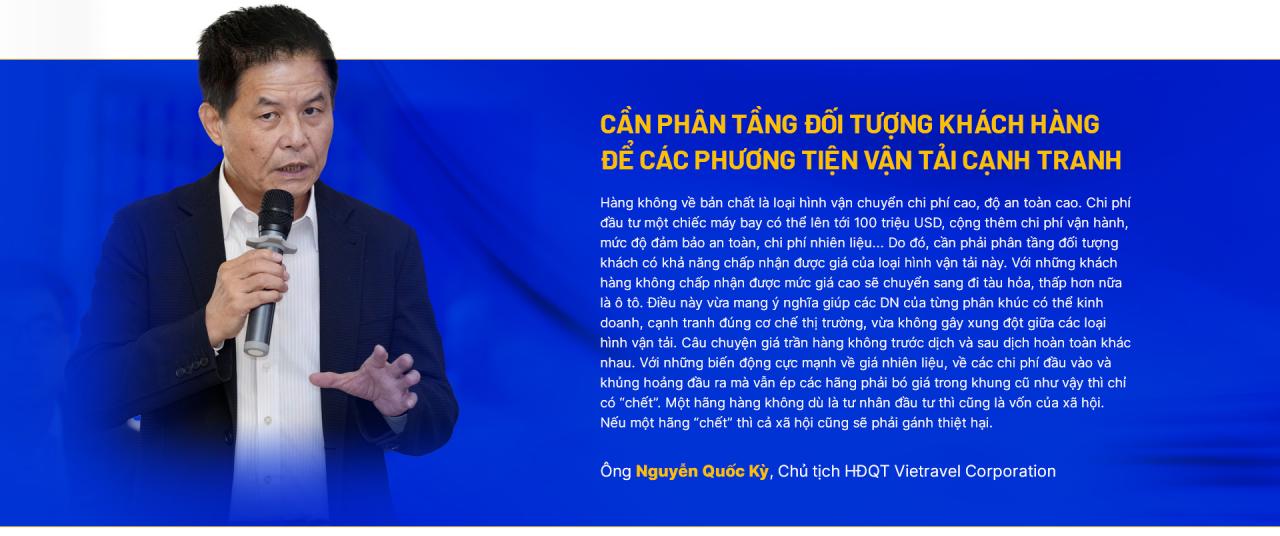

No matter how difficult it is, Vietravel must fly.
In that context, sadly, the level of interest of the Government for the aviation industry is still too vague. There has not been any general policy for the industry issued to support airlines to overcome difficulties. The Government has met with each industry to discuss recovery strategies, but not aviation. Above, I told the story of people wondering why Vietravel Airlines is still alive, right? Actually, every time I hear that, I just laugh. It is not to prove anything, but because... they are so right. If the situation continues like this, it will not only affect Vietravel Airlines. The entire aviation market will soon turn negative. He always said, "A pessimist always finds difficulty in every opportunity. An optimist always finds opportunity in every difficulty." He was also proud that the principle that has become Vietravel's culture is: when a crisis occurs, it must be turned into an opportunity. Must be clear-headed to think of a way out. But what you just said doesn't seem to be in line with your own philosophy before? The times I led Vietravel out of crisis gave me experience to calmly steer, slowly adjust, but most of all, I saw the steps to get out of difficulties. As for aviation, everything is roundabout, the knots are very difficult to untie, or if untied, it will take a long time. And the business is exhausted now. If the wave continues to come, what will support it? As I said above. The biggest difficulty of aviation does not come from objective factors but from internal shortcomings. Recently, I had the opportunity to work with SP-SSA - the largest port exploitation group in the US. When I went there, I was very surprised that most of the places with large ports are public investment and private exploitation. That is, the state bids for the right to exploit that public facility for a certain amount of time, for a certain amount of money, the state will recoup that amount, and the rest is for the private sector to exploit. Ships arrive, they exploit and do business on the available infrastructure system. They take the profit and bear the loss. This business model is also applied at some airports. Thanks to that, the speed of infrastructure development is always enough to meet the development needs of the market, airlines and shipping lines.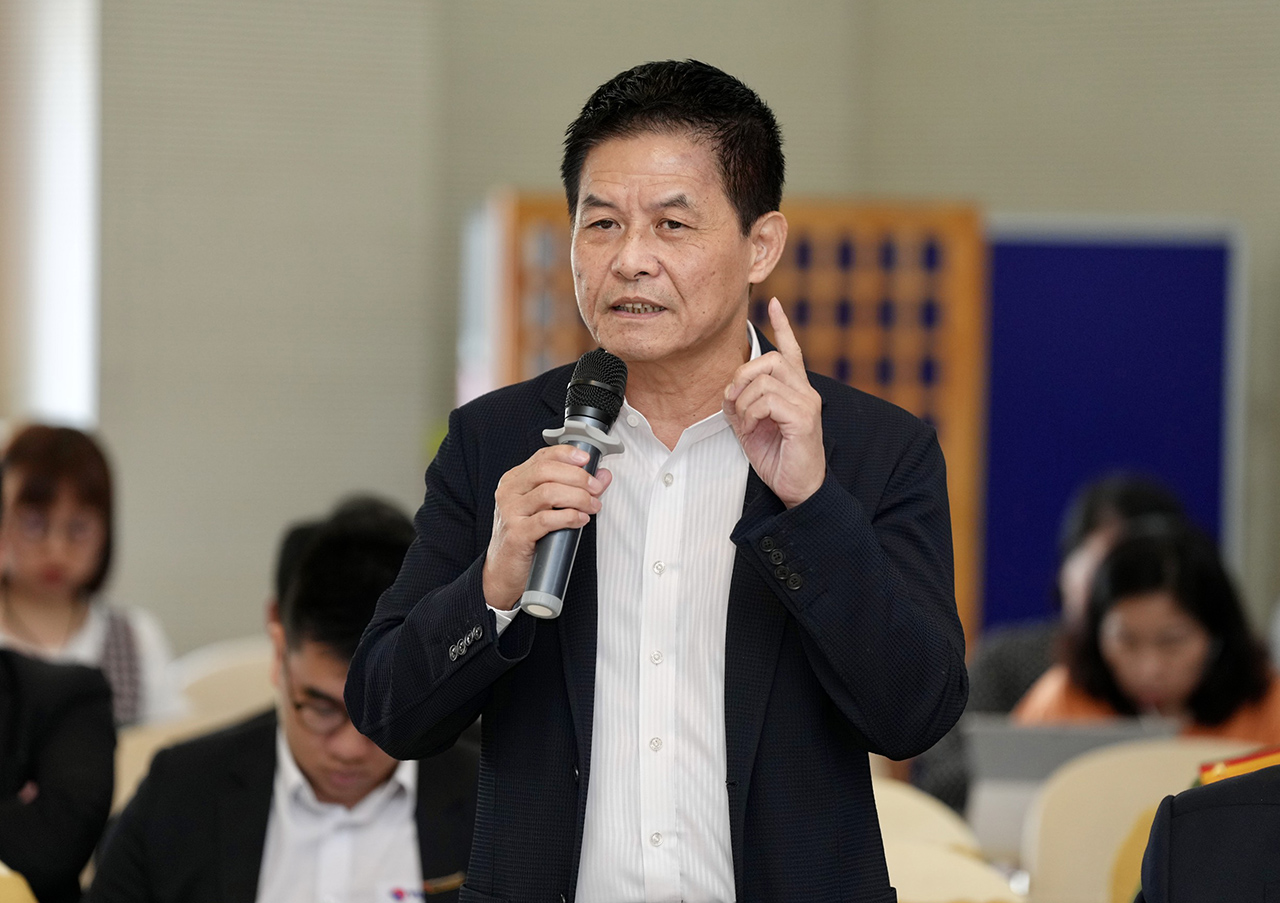
"It cannot be denied that if you just do tourism, you will be leisurely, but if you go into aviation, you will be in trouble. But I have never regretted it because the birth of Vietravel Airlines was an inevitable thing to do" - Mr. Nguyen Quoc Ky affirmed. Photo: Doc Lap
They also clearly define the airport systems, connecting them in the chain with each other, with airlines, service providers... Infrastructure, slots are also stratified, classifying in detail which types of aircraft, which routes are granted slots by the state, which level is only available to the federation; which airports do low-cost airlines fly to, which airports do full-service airlines fly to... In general, the transportation system is positioned, stratified very clearly and each link operates according to the market mechanism, supporting each other. Looking at Vietnam, the story is still very far away. The current service structure system is divided into many segments, many sections, each segment, each group does not have support, sharing with each other. Each segment requires its own profit, system. When an airline comes to work, it has to connect with all groups, which is very hard. That also partly explains why airlines are losing money but flight service units are not, even "living well". In Vietnam, the operating model of Vietnam Airlines is perfect, the dream of airlines, and it is not easy to achieve in the world. But why is Vietnam Airlines still losing money? Because there are still many problems. Like the story of airfares. The government imposes a ceiling price but lets go of the floor price, leading to negative price competition. Due to economic difficulties, businesses have to cut costs to the maximum, tighten all costs to the lowest level, even accept losses to have low-cost airfares for train passengers who can "reach" to board the plane. This is also a way for low-cost airlines to "liquidate" the railway, especially on short routes of about 300 - 400 km. If this continues, both airlines and railways will not survive. Is such a price mechanism in accordance with the market mechanism? He also admitted that if the price ceiling is removed, airfares will likely increase, especially during peak periods. If prices are pushed up, "forcing" those who do not have the economic means to take trains or cars, will competition in the aviation sector still have meaning? In fact, it is not true that removing the price ceiling will only increase airfares, not decrease. If businesses have the conditions to reach the break-even point, costs will automatically decrease, and prices will also decrease. Only then will true competitiveness be ensured. In general, the story begins with the mechanism and strategic orientation of the Government on how it wants to use aviation, what role it wants aviation to play, and what percentage it will account for in the current transportation system, goods trading system, and tourism system. From there, the scale of investment can be decided, from policy to strategic infrastructure. The journey to become a "captain" seems much more arduous than being the "captain" of Vietravel. Have you ever regretted your decision? It is undeniable that if you just do tourism, you will be leisurely, but if you enter aviation, you will be in trouble. But I have never regretted it because the birth of Vietravel Airlines was an inevitable thing to do. I promised the Government that I would build Vietravel Airlines into the first tourism airline in Vietnam, with the mission of connecting Vietnam tourism with the whole world. Therefore, no matter how difficult it is, I must fulfill the mission I committed to the Government and the country./. Source: https://thanhnien.vn/chu-tich-hqt-vietravel-corporation-nguyen-quoc-ky-kho-may-vietravel-airlines-cung-phai-bay-185231011130715252.htm
He also admitted that if the price ceiling is removed, airfares will likely increase, especially during peak periods. If prices are pushed up, "forcing" those who do not have the economic means to take trains or cars, will competition in the aviation sector still have meaning? In fact, it is not true that removing the price ceiling will only increase airfares, not decrease. If businesses have the conditions to reach the break-even point, costs will automatically decrease, and prices will also decrease. Only then will true competitiveness be ensured. In general, the story begins with the mechanism and strategic orientation of the Government on how it wants to use aviation, what role it wants aviation to play, and what percentage it will account for in the current transportation system, goods trading system, and tourism system. From there, the scale of investment can be decided, from policy to strategic infrastructure. The journey to become a "captain" seems much more arduous than being the "captain" of Vietravel. Have you ever regretted your decision? It is undeniable that if you just do tourism, you will be leisurely, but if you enter aviation, you will be in trouble. But I have never regretted it because the birth of Vietravel Airlines was an inevitable thing to do. I promised the Government that I would build Vietravel Airlines into the first tourism airline in Vietnam, with the mission of connecting Vietnam tourism with the whole world. Therefore, no matter how difficult it is, I must fulfill the mission I committed to the Government and the country./. Source: https://thanhnien.vn/chu-tich-hqt-vietravel-corporation-nguyen-quoc-ky-kho-may-vietravel-airlines-cung-phai-bay-185231011130715252.htm







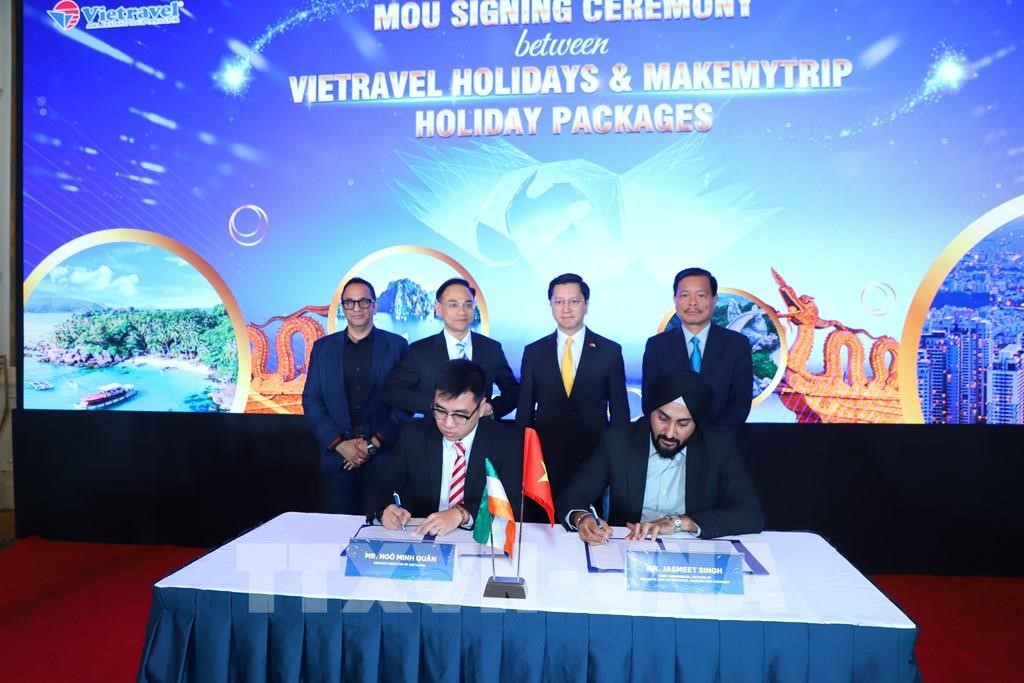




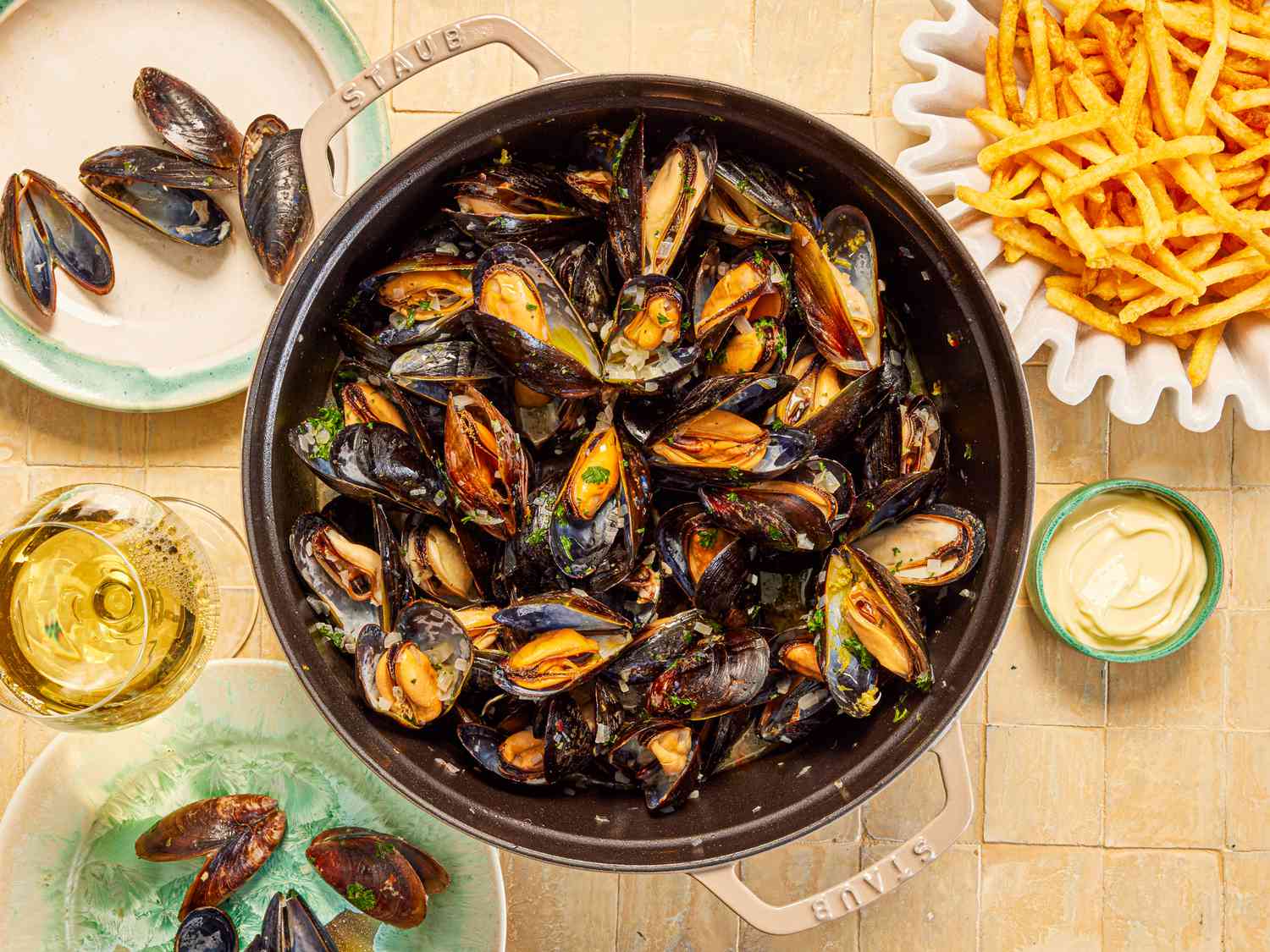




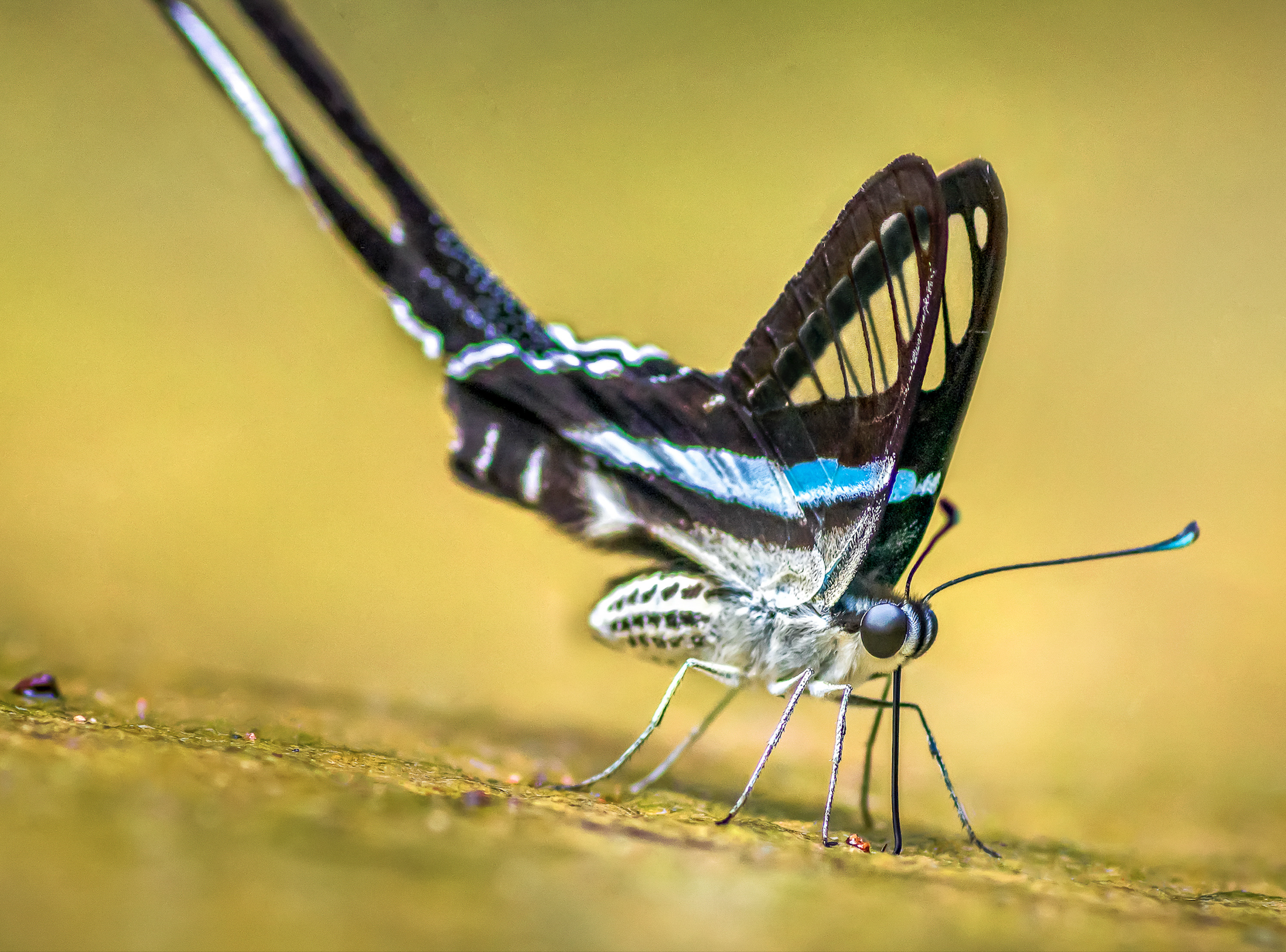

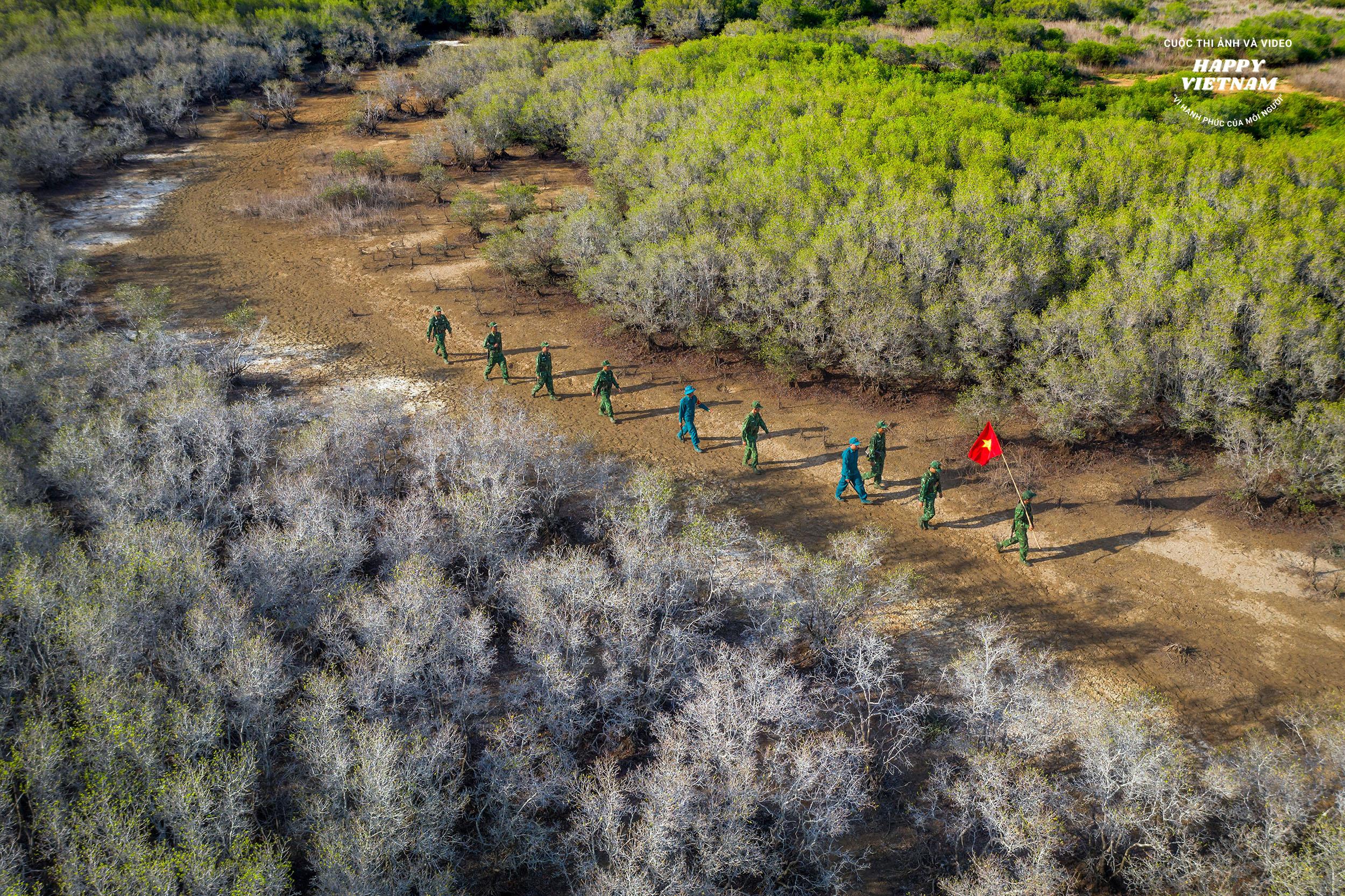
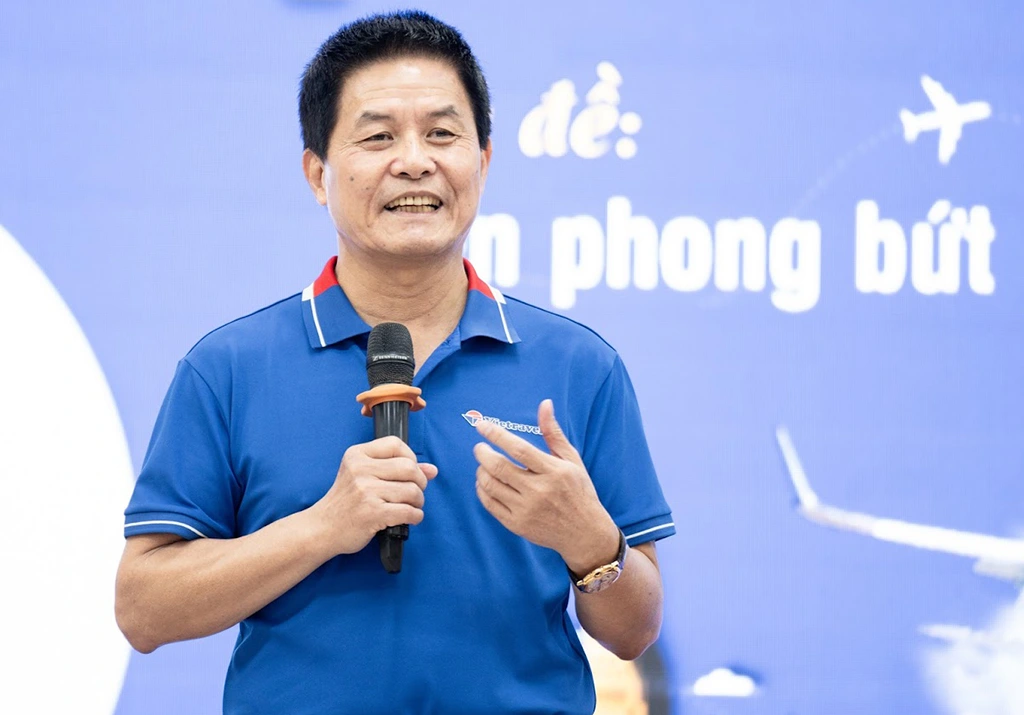




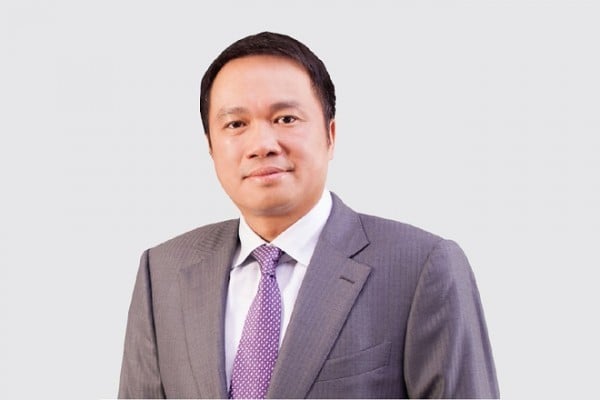
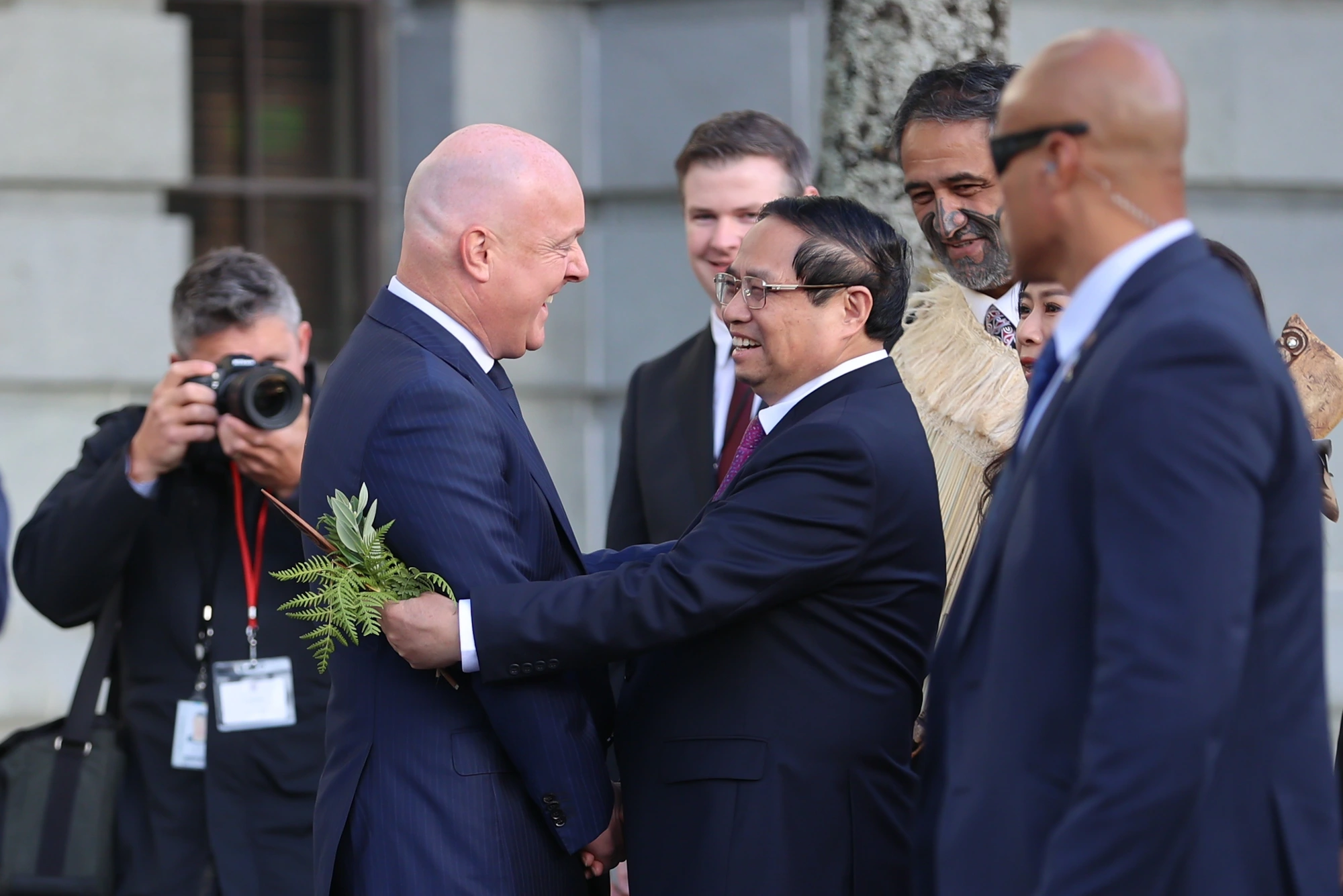
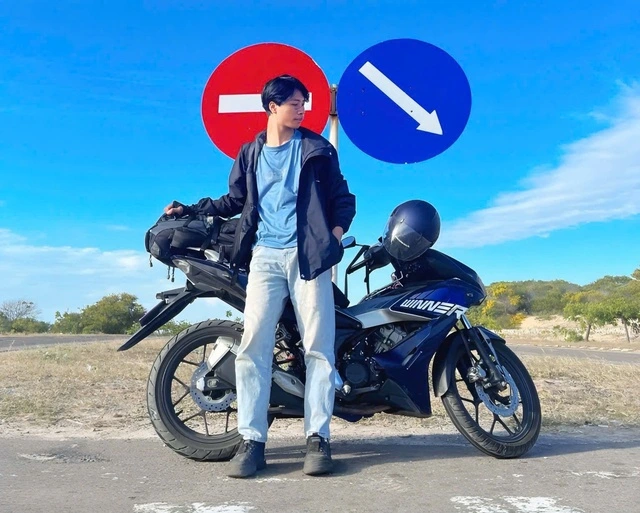
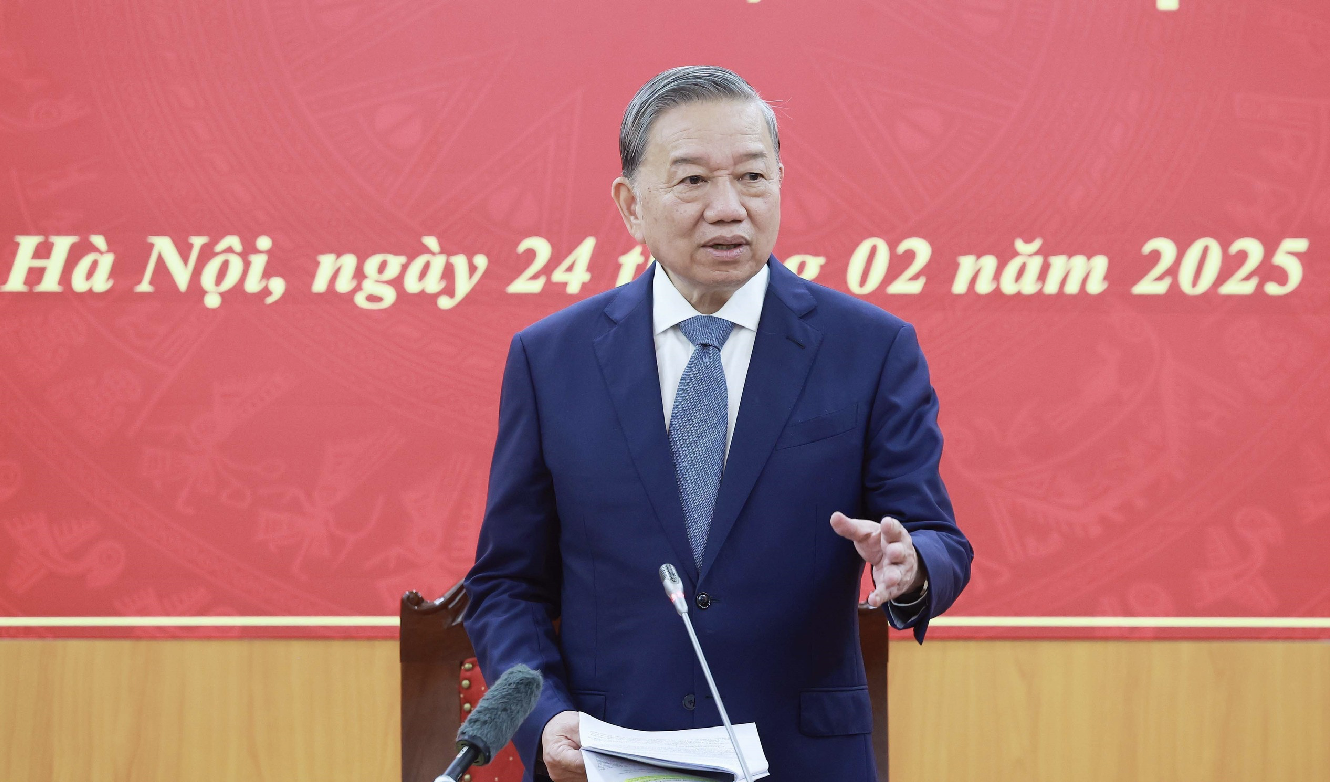








![[Photo] Prime Minister Pham Minh Chinh chairs Government Conference with localities on economic growth](https://vstatic.vietnam.vn/vietnam/resource/IMAGE/2025/2/21/f34583484f2643a2a2b72168a0d64baa)


























































Comment (0)